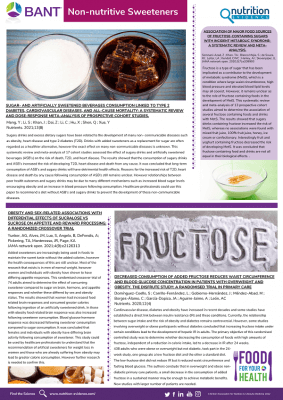
21 Jan 2022 Nutrition Evidence Alert – January 2022 – Added Sugars & Health
Welcome to the January edition of the Nutrition Evidence Alert.

Excess dietary sugars have been associated with the development and sustained incidence of Metabolic Syndrome. Over the past few decades, artificial or non-nutritive sweeteners have been used as a ‘healthier’ alternative to sugar, but with what impact on non-communicable diseases? Whilst the scientific results remain contradictory, the case is building against added free-sugars, as links are made with risk of death from all-cause mortality and the development of type 2 diabetes and heart disease.
This edition of the Nutrition Evidence alert brings you a representative sample of the evidence in this sphere. You can read the top picks in the list below and further explore the topic with a full range of articles here. Enjoy exploring, so you are prepared for questions on this topic as the nation focuses on their health – and getting in shape – at the beginning of a new year.
Hot off the Press!
Don’t miss the new randomised controlled trial released in the past 2 weeks, which concludes that a patented probiotic formulation (Probio7 – AB21) is associated with increased viral and symptom resolution during active COVID-19 infection compared to placebo, possibly driven by immune alterations via the gut-lung axis. Read the summary and get access to the full paper here.
Top picks of research on Sugar Impacts:
Association of Major Food Sources of Fructose-Containing Sugars With Incident Metabolic Syndrome: A Systematic Review and Meta-analysis in JAMA Network open. 2020
Association between intake of non-sugar sweeteners and health outcomes: systematic review and meta-analyses of randomised and non-randomised controlled trials and observational studies in BMJ (Clinical research ed.). 2019
Effect of nutritive and non-nutritive sweeteners on hemodynamic responses to acute stress: a randomized crossover trial in healthy women in Nutrition & Diabetes. 2020
Acute Metabolic Responses to Glucose and Fructose Supplementation in Healthy Individuals: A Double-Blind Randomized Crossover Placebo-Controlled Trial in Nutrients. 2021
A Dietary Intervention with Reduction of Starch and Sucrose Leads to Reduced Gastrointestinal and Extra-Intestinal Symptoms in IBS Patients in Nutrients. 2019
Association of Major Food Sources of Fructose-Containing Sugars With Incident Metabolic Syndrome: A Systematic Review and Meta-analysis in JAMA Network Open. 2020
Acute Metabolic Responses to Glucose and Fructose Supplementation in Healthy Individuals: A Double-Blind Randomized Crossover Placebo-Controlled Trial in Nutrients. 2021
Download the NED InfoBite on Non-Nutritive Sweeteners
 Our scientific NED InfoBites are especially designed to provide you with our pick of the latest research in a handy one-page pdf, ideal for sharing with colleagues and clients within a clinical setting.
Our scientific NED InfoBites are especially designed to provide you with our pick of the latest research in a handy one-page pdf, ideal for sharing with colleagues and clients within a clinical setting.
Download the Non-Nutritive Sweeteners InfoBite here
Discover all available InfoBites here
Read our latest article -‘The truth about sugar and non-nutritive sweeteners‘
In July 2021 the publication of the UK’s National Food Strategy-The Plan shone the light once again on the ongoing costs of poor diets, defined as those high in fat, sugar and salt (HFSS) and the impact on population health and the NHS. One of the recommendations within the plan is the introduction of a sugar and salt reformulation tax prompting BANT to look at the current evidence once again on sugars and non-nutritive sweeteners.
Read the full article here
Discover more resources as part of the BANT Food for your Health Campaign

BANT is spearheading the ‘Food for your Health’ campaign to raise awareness of the benefits of personalised nutrition and lifestyle medicine and to educate the public on making healthy food choices to prevent and manage metabolic conditions, including those associated with overweight and obesity. Click through to our campaign page for a range of free resources https://bant.org.uk/food-for-your-health/ including our NED Infobites, designed to help simplify the science and help everybody understand the evidence behind nutrition, and our Eat a Rainbow infographic to help you include more colourful plant foods in your daily diet.

